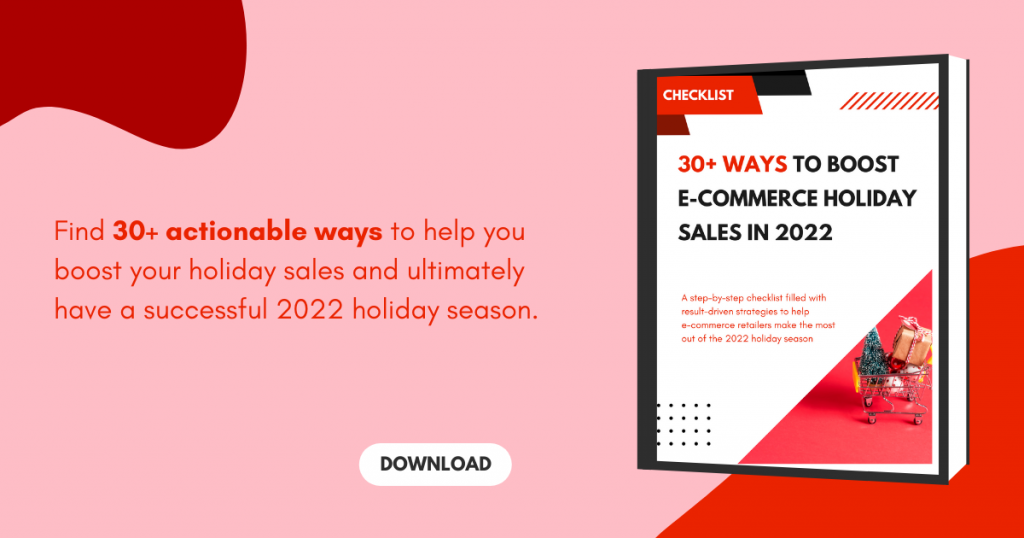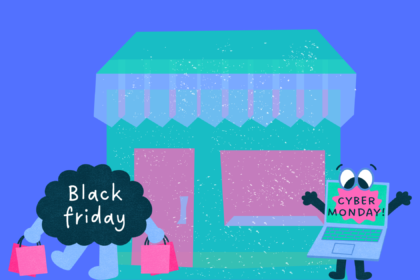For shoppers, the festive season comprises the much-needed break they deserve from their daily lives to spend quality time meeting friends, family, and colleagues; traveling; buying gifts for their loved ones; etc.
However, for e-commerce retail businesses the next 3 months (From Halloween to New Year) are pretty hectic, as they have to come up with new initiatives to sell more products, delight all customers, and most importantly have a season to remember.
To help them save time and effort. We have come up with some ideas that can help them get prepared in advance and increase revenue opportunities this festive season.
Without further ado, let’s take a look at what they are.
But before that, we at LateShipment.com have prepared a downloadable checklist comprising 30+ actionable ways to help you boost holiday sales. Feel free to check it out.
How E-commerce Businesses Can Have a Great Festive Season in 2022
1. Anticipate higher than regular seasonal visitors/potential shoppers
Holiday sales are usually 3x or even 4x than the rest of the year. Also, this year, experts are still hopeful of holiday retail and e-commerce sales increasing over 2021 numbers despite inflation putting a burden on customers’ spending.
Thus, it is clear that e-commerce businesses will have to deal with a higher number of shoppers than usual. However, more shoppers won’t equal more sales if businesses have not anticipated this holiday season trend.
For example,
- A website/ application that is not optimized to handle the incoming traffic and crashes often
- A lack of inventory at hand that there are frequent ‘out-of-stock’ labels on fast-selling products
- Insecure site and payment gateways
- A lack of personalized experience
All of it can cause customer dissatisfaction and discourages sales and repeat purchases.
Therefore, businesses must start with an optimized shopping experience to enjoy festive season success before the incoming rush.
2. Get into the festive mood
A great way to display trustworthiness in today’s scenario is staying relevant to the current trends and frequently updating business practices to suit the customers’ trends.
Let’s take a look at the former for now.
Imagine customers with the festive mood flowing through them, looking for holiday gifts for a very important person in their life. But to their shock, the website looks the same old — without a holiday theme, no special season offers, no special product launches, etc. This gives them the feeling that they might be shopping for the holiday season in March and June. And this might be bad for businesses.
To avoid this scenario, businesses must extend the holiday theme across social media promotions, landing pages, and the website (primarily the home page and product pages) to display that they’re just as excited about the festive season as their customers.
3. Provide a lot of seasonal offers and giveaways
Attracting customers’ attention by getting into the festive mood is just half the job done. There’s more to do if businesses are actively looking to increase their conversion rates. All of it involves providing offers and giveaways.
- Run limited-time offers such as “Flat 25% on combos”, “Buy 1 Get 1”, etc.
- Include giveaway elements such as a countdown timer or a limited-period discount spin-wheel on your landing pages
- Share special offers for customers who are sitting on the fence
- Use non-product marketing techniques such as “Free shipping and returns”, “Cash-on-Delivery”, “BOPIS, etc.
- Begin a customer loyalty program and share personalized recommendations during order tracking moments (products that go well together)
Such offers can help businesses to bring in new customers by catching their attention, preventing cart abandonment, and also encouraging repeat shoppers.
However, businesses must keep in mind that offers must be treated as the last arrow in the quiver. Therefore, they must be strategically placed across campaign funnel stages, so that they’re not overlapped and result in higher acquisition costs.
4. Expand your sales channels to boom festive season sales
One of the great ways for businesses to maximize sales during the festive season is considering making use of multiple channels other than their e-commerce store, such as:
- Online marketplaces such as Amazon, eBay, and Etsy.
- Social commerce: sell your products directly on social platforms such as Facebook and Instagram.
- Brick-and-mortar shops: Ensure your efforts are consistent across online and offline channels.
The idea of selling your products on multiple channels, particularly social media platforms is a great way to improve the CX as customers now enjoy better convenience by shopping from the place where they spend most of their time.
All brands have to do now is not stop with just introducing different channels but integrating them to offer the same level of experience across channels.
5. Update your seasonal merchandising strategy
The festive season is also a great way to introduce new products to your showcase. It might be too late to start with it now. But I’m guessing you, as an e-commerce retailer, would’ve had that figured out.
Interacting with customers can give brands an idea of what their customers expect from them. If a major demographic of them desire specific seasonal products, then brands have no choice but to sell them as holiday specials.
Even if brands aren’t keen on introducing new products to their shelves, they can still make use of their merchandising strategy by categorizing seasonal items into holiday gift bundles and creating upsell and cross-sell opportunities.
Quick pro tip: ensure that the product pages have clear and accurate product descriptions, sizing charts, etc. This creates a win-win situation for both customers and merchants as the former is now the recipient of a great customer experience while the latter can reduce cart abandonment.
6. Focus on providing memorable post-purchase experiences
All brands are hell-bent on making their customers hit that ‘buy’ button. But most of them unwillingly leave out what happens later as they feel the post-purchase phase to be the responsibility of a third-party shipping carrier (who does not share the same level of commitment to it as you do).
However, what must be kept in mind is that the post-purchase experience is just as (if not more) important than every other step in the customer journey. It’s the last touchpoint your customer will have with your brand, and if, God forbid, it goes haywire, it could be what your customers remember most about your brand.
For starters, here are some ways e-commerce businesses can focus on providing memorable CX in the post-purchase phase:
- Proactively resolve delivery issues before they impact your customer.
- Keep customers updated on their order status to mitigate customer anxiety about late deliveries and lost/damaged shipments.
- Provide an on-brand and seamless order tracking experiences.
- Regularly collect customer feedback and make better shipping decisions to optimize the shipping experience.
- Make the returns process easy and frictionless for your customers.
- Make the packaging and unboxing experience special via personal and seasonal messaging.
Remember, don’t just stop with making a one-time sale. Also focus on providing memorable post-purchase experiences, as they are key to customer delight and long-lasting relationships.
Final Word
We’ve just scratched the surface here.
For deeper insights, feel free to check out our downloadable holiday sales checklist for the 2022 season.
The checklist provides you 30+ actionable ways to help you boost your holiday sales and ultimately have a successful 2022 holiday season.





![Holiday Season Marketing Calendar and Shipping Deadlines [2021] Blog Header](https://lswordpress.s3.amazonaws.com/blog/wp-content/uploads/2021/08/17065221/Holiday-Season-Marketing-Calendar-and-Shipping-Deadlines-2021-Blog-Header-420x280.png)



